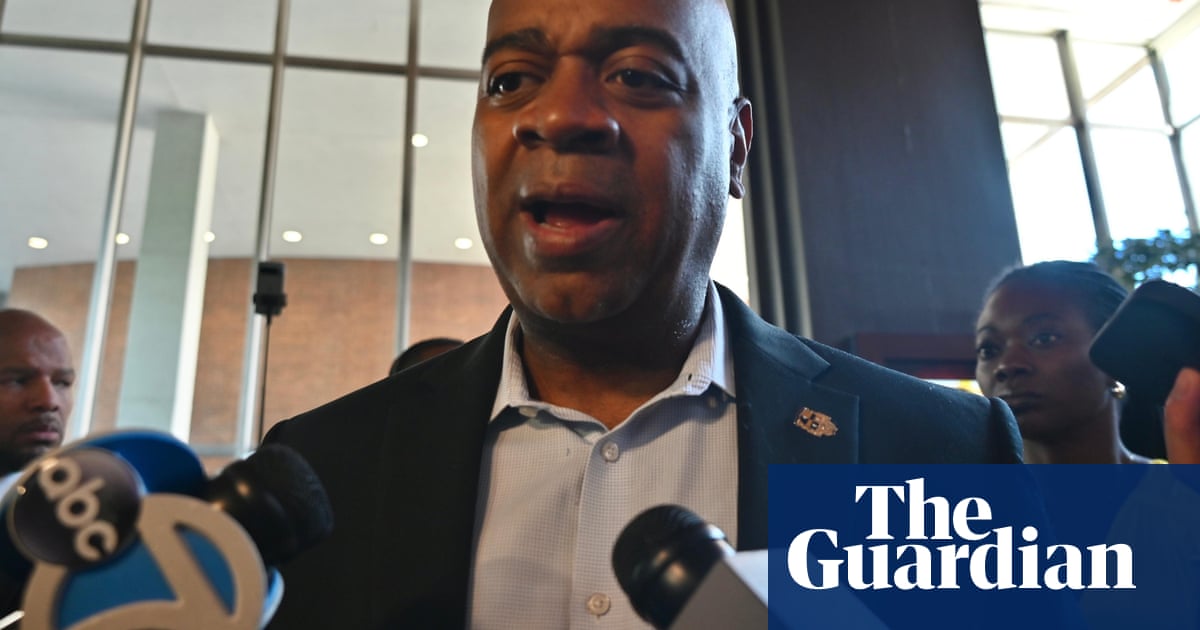Speaking out after his arrest on Tuesday, the Newark mayor Ras Baraka said his city would continue its fight in court against the company that runs an immigration detention facility inNew Jersey.
“I know there are some protests that other people are planning, and if I feel obligated to be there, I will,” Baraka told theRev Al Sharptonon MSNBC Saturday afternoon. “This doesn’t stop the city’s contention with the Geo Group, and we’re going to continue in court with them.”
Baraka was arrested Tuesday morning after joining three members of Congress at a protest and press conference outside a new Immigration and Customs Enforcement (Ice) detention facility located in Newark known as Delaney Hall.
He was arrested by homeland security agents and taken into custody at a separate facility in Newark. The mayor was released about five hours later and charged with trespassing.
Meanwhile, the Department of Homeland Security spokesperson Tricia McLaughlintoldCNN Saturday morning that “there will be more arrests coming” after the protest at the facility, saying that the arrests of the three Democratic members of Congress who were there – Bonnie Watson Coleman, Rob Menendez and LaMonica McIver – are “on the table”.
McLoughlin told CNN that the lawmakers “put law enforcement at risk, this actually put the detainees as well at risk” and said that DHS have “body-camera footage of some of these members of Congress assaulting our Ice enforcement officers”.
Newark suedGeo Groupafter the company won a 15-year $1bncontractwith Ice to run Delaney Hall,sayingthat the company was renovating the facility without proper permits and that city inspectors had been barred from entering the center.
Federal officials and representatives from Geo Group denied the allegations and told theNew York Timesthat the company had the proper permits, saying that Baraka’s arrest was a “publicity stunt by the mayor”, who is also running in the state’s gubernatorial race.
“The mayor has been informed that he is more than welcome to enter the facility, as long as he follows security protocols like everyone else,” McLoughlin told the Times.
At the protest Tuesday, Baraka joined Coleman, Menendez and McIver, who were allowed into the facility as part of an oversight visit.
In a video reviewed by the New York Times, a homeland security agenttoldBaraka he could not enter the facility like the Congress members, or he would be arrested.
Baraka, who was in a crowd of people, told Sharpton that he left the entry gates “several times”, and he was ultimately arrested outside the facility gates. Baraka insists that he “didn’t do anything wrong”.
Baraka told Sharpton that DHS was “treating us just like a regular case”.
“I was put in the cell, I was given a mug shot, fingerprinted, charged with a federal crime of trespassing,” Baraka said, adding that the police were “treating [him] pretty good”.
Baraka emphasized that the federal government wasn’t sharing information about who was being kept in the detention facility.
“We don’t know what’s going on in there, we don’t know who’s in there. They don’t allow inspectors. They’re not complying with local laws,” Baraka said. “They feel like they don’t have to go to court.”
